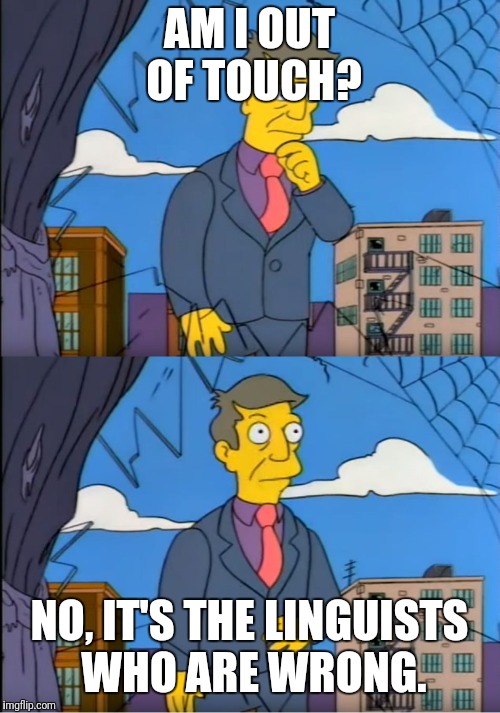rdearman wrote:Or 5 I am correct and you have made a generalised sweeping statement which is logically unsupportable.

rdearman wrote:Or 5 I am correct and you have made a generalised sweeping statement which is logically unsupportable.

rdearman wrote:Look. You made a sweeping generalization about huge groups of people. I am not arguing linguistics, I am arguing that not everything that comes out of a natives mouth or keyboard is correct. Yet I have shown you written proof that this assertion is not correct. You aren't defending your statement. If you had used the word "most" or "generally" I wouldn't have batted an eyelid, but you didn't you said "all native language is correct".All - Used to refer to the whole quantity or extent of a particular group or thing
This is a sweeping generalization which I take exception to. All means that not once in the entire human history in any language has there been an error spoken by a native speaker of that language.
This is the position I want you to prove. Prove no human ever has made an incorrect statement.
rdearman wrote:Humans make mistakes, so the statement no human has made a mistake when speaking thier language ever in the history of human life is synthetic. Now show me the data.
According to Kant, if a statement is analytic, then it is true by definition. Another way to look at it is to say that if the negation of a statement results in a contradiction or inconsistency, then the original statement must be an analytic truth. So let's negate the statement.
"all native language is incorrect"
Well this would seem to be inconsistent with facts. So the statement is synthetic not analytic. Let's see the data.
rdearman wrote:So everyone has their own Native Language and it just happens to overlap on occasion with the Native Language of others? So your basically saying there is no such thing as a language just what each of us carry around individually.
rdearman wrote:So everyone has their own Native Language and it just happens to overlap on occasion with the Native Language of others? So your basically saying there is no such thing as a language just what each of us carry around individually.
Return to “General Language Discussion”
Users browsing this forum: DaveAgain and 2 guests